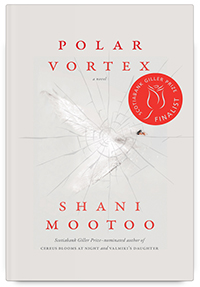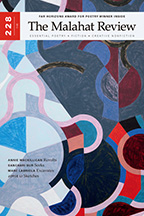Reviews
Fiction Review by Deborah Torkko
Shani Mootoo, Polar Vortex (Toronto: Book*hug, 2020). Paperbound, 283 pp., $23.
 “Surely all people have a little lockbox, if not a full closet, that contains shards of shame,” ruminates Priya, the protagonist of Shani Mootoo’s fifth novel, Polar Vortex, which explores the psychologies at play when we deliberately conceal our deep fears and vulnerabilities from closest friends and intimate others. In the circadian tradition, books set within the confines of a single day, Mootoo brings to life Priya’s interior world. With a sharp focus on the minutiae, the granular, and the contingent, Mootoo draws us into the vortex: twelve daylight hours in Priya’s life. These hours unfold in an effortless flux between past and present. We learn about Priya’s conflicted sense of self and how this troubles her nearly four‐decades‐long friendship with Prakash, a straight Indian man from Uganda, and Alex, her white, lesbian wife of six years. We learn what becomes of one’s sense of self and relationships in the face of secrets and duplicity. We learn how shame is inextricably braided to never wholly belonging, stretched between the irreconcilable worlds of private self—an interior life of personal secrets—and public persona, an external life in which secrets are kept hidden.
“Surely all people have a little lockbox, if not a full closet, that contains shards of shame,” ruminates Priya, the protagonist of Shani Mootoo’s fifth novel, Polar Vortex, which explores the psychologies at play when we deliberately conceal our deep fears and vulnerabilities from closest friends and intimate others. In the circadian tradition, books set within the confines of a single day, Mootoo brings to life Priya’s interior world. With a sharp focus on the minutiae, the granular, and the contingent, Mootoo draws us into the vortex: twelve daylight hours in Priya’s life. These hours unfold in an effortless flux between past and present. We learn about Priya’s conflicted sense of self and how this troubles her nearly four‐decades‐long friendship with Prakash, a straight Indian man from Uganda, and Alex, her white, lesbian wife of six years. We learn what becomes of one’s sense of self and relationships in the face of secrets and duplicity. We learn how shame is inextricably braided to never wholly belonging, stretched between the irreconcilable worlds of private self—an interior life of personal secrets—and public persona, an external life in which secrets are kept hidden.
The novel opens with Priya waking from a lurid dream about Prakash, one she has had several times. The dream presents for her another domain of experience as valid as is her waking life, and it meaningfully connects her inner self with her outer world. The dream’s latent content, elements from her waking life, are condensed and juxtaposed to relay the anxieties of her psychological‐emotional landscape and her unsettled friendship with Prakash, with whom she severed communication when she married Alex. Priya spends the first third of the novel in bed tirelessly prevaricating about the marital agitation caused by her renewed Twitter communication with Prakash, whom she invites to stay overnight. Priya is unsettled: “the old shapeshifting that was once required of [her] to survive resurface[s].” Anxious, Priya deliberates: “So who will I be when Prakash gets here? The person he once knew, or the one Alex lives with?”
The narrative phrasing shows how Priya has spent most of her life suspended between belonging and not belonging, trying to fit in. “Forever conscious of what others are thinking and feeling,” Priya with her uncertain sense of self modulates her words and behaviour to manipulate her relationships. She would “command space and time with stories …, wording and structures honed for desired responses.” She hides “how powerless and frightened and alone [she] had often felt.” Priya fears scorn and pity if Alex knew how she used her friendship with Prakash to meet her emotional needs, and she feels guilt that she has not “come clean” with Alex about Prakash, the “kind of closeness” they shared.
We excavate truth through stories to create narratives about who we are and why we behave the way we do. The first third of the novel is told from Priya’s point of view. Mootoo then introduces Alex’s and later Prakash’s points of view, which serve to sketch a more complex portrait of our protagonist. Mootoo’s deft handling of point of view further unveils the secrets, motivations, and vulnerabilities of all characters; none is completely innocent.
This novel is not what happens on the surface, but about the characters’ interior lives. “Calm on the surface but paddling like hell underneath” describes Priya’s struggle to construct a confident, selfassured persona. But communications fail, emotions erupt, and characters are vulnerable and wounded. Depicting the characters’ challenges in finding the words and gestures that might ease their tensions and help them listen in the gaps and silences for what is not said, Mootoo exposes the rich inadequacies of human communication, yet remains attuned to the often precarious dynamics between her characters. Strangeness and mystery prevail. We know more about the characters than the characters know about themselves or each other, and, with Mootoo’s skillful attention to nuance and detail, we discover how “well‐practiced posturing” and communication through “discretions and half‐truths” ultimately fail.
Rather than recourse to the Trinidadian landscape, typical of her earlier fiction, or urban centres where immigrants of colour often gather, Mootoo sets Polar Vortex in the winter chill of small‐town rural Ontario, a landscape that mirrors the characters’ emotional terrain. Mootoo’s distinctive talents as a visual artist offer many fine descriptions of landscapes that mirror the characters’ “subterranean hurt,” “tempered rage,” and restlessness: “Knife‐edged cliffs jutted out of the ice boulders into the sky and then dropped off into gemlike blueand‐ green canyons…. A heaving, thumping rebellion came from beneath the surface. It wasn’t a stretch to imagine water undulating, restless, captive, wanting an escape from all that ice.”
Polar Vortex does not reproduce easy assumptions and collective ideas about race, identity politics, and mixed relationships. Written with sensitive lucidity, the novel creates its emotional effects naturally, almost indirectly, and we close it with appreciation for Mootoo’s undeniable empathy for her complicated and troubled characters. The power of this novel is the individual characters and their particularized experiences of the larger world and each other. Mootoo presents new possibilities for how we might understand difference and confront secrets, shame, and difficult truths with compassion for our flawed humanness and mystery at the heart of our relationships.
—Deborah Torkko









